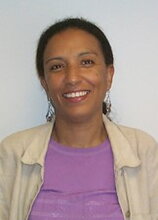
Zakia Salime, a doctoral student in Sociology with a concentration in Gender Relations in International Development at the University of Illinois at Urbana-Champaign, is from Morocco. She has a Master's in Sociology (1985) from the University of Toulouse-Le Mirail, France and a Bachelor's in Sociology (1981) from the University Mohamed Ben Abdellah, Fes, Morocco. She has held a teaching position at the Training Institute for Teachers in Morocco from 1985-1999 and has served on a variety of policy committees for the Moroccan government. She also founded a local non-governmental organization in Morocco called "Women's Space" which focuses on improving poor women's skills in microcredit and their access to market funds. She has received several grants to attend United Nations conferences as well as scholarships and fellowships for academic studies. She is a member of the African Network for the Economic Empowerment of Women under the auspices of the United Nations Economic Commission for Africa. She is also president of ESPOD Association for Promoting Women's Micro-Enterprises and a member of Mediterranean Women's Creativity. Ms. Salime has conducted research on issues such as women's health and fertility, women's business enterprises, and youth attitudes on women's participation in politics and violence against wome. She has published twelve articles from this research in Moroccan journals and also has chapters forthcoming in books to be published by Routledge and Indiana University Press.
Ms. Salime's current thesis research challenges the simplistic formulations of the relationships between various feminisms and religions in the Arab world. She plans to analyze the political participation and public discourse of women's groups in Morocco and their influence on thestate's policy toward implementing women's rights. She will look at the divisions between the "fundamentalist" and the "democratic" women's groups in the context of globalization and growing fundamentalism in the Maghreb region.
Ms. Salime states that she hopes her findings will help "build programs at the grass-roots level to combine my concern for women's economic security with my will to facilitate women's access to decision making. In the long term, I also hope to find some common ground between those two opposite sections of women's groups that could be used to unify theirstruggle about gender inequalities and enhance their access to decision making.